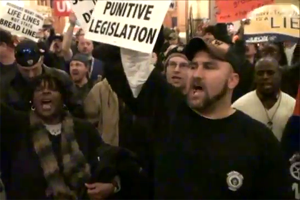Thousands Rallying to Stop Indiana's 'Right to Work' Steamroll

As they fought to put a “right-to-work” bill to a voter referendum, Indiana Democratic legislators boycotted House sessions yesterday and today—and were locked out of caucus rooms by Republican-majority leaders.
Protests against the anti-union bill have been steadily growing since the 2012 legislative session opened two weeks ago. Daily rallies at the statehouse now draw crowds in the thousands.
Democrats ended up caucusing in a circle of chairs on the rotunda floor Wednesday, surrounded by throngs of protesters decrying the legislation, before Republicans relented and re-opened the rooms. Democrats have signaled their intent to stay away from House sessions until they can offer an amendment that would put the Republicans’ anti-union bill to a statewide referendum of voters. Republicans have the votes to pass the measure in the legislature.
The so-called right-to-work law would allow workers to reap the benefits of union representation without joining the union or paying dues. Opponents say such laws drive everyone’s wages down and contribute to more dangerous workplaces. “It’s a ‘falling tide’ effect,” said David Williams of the Laborers.
Democratic leader Patrick Bauer had sought assurance from Republicans that they would not block a vote on the referendum amendment, before agreeing that Democrats would show up for work this week.
The vote, however, never happened. Democrats skipped out on the afternoon session Tuesday after hearing the referendum may be unconstitutional. They said Republicans have cut off testimony against right to work, turned off the sound system so protesters outside couldn't follow the proceedings, and attempted to limit the number of people who could come protest.
Republicans in turn made good on earlier threats of financial sanctions, passing a motion to fine each no-show legislator $1,000 per day. The same penalties were imposed last year during the Democrats’ five-week walkout that ultimately scuttled an earlier attempt to pass right-to-work. Democrats said they would pursue a court order to stop the deduction of fines from their expense checks.
Despite Governor Mitch Daniels’ claims that Indiana residents support right to work by a two to one margin, a poll conducted by the Indiana AFL-CIO last weekend shows only 33 percent of Hoosiers in favor. Thirty-six percent oppose the bill, and the remaining 30 percent have no opinion. Seventy-one percent of Indiana residents would like the chance to vote on the anti-union bill through a referendum.
Growing Opposition
Townhall meetings across the state and union-led phone banks and canvasses have helped direct attention toward the issue in a state where union density hovers around 11 percent, lower than the national average.
Herb Anderson, a Steelworker at the BF Goodrich Tire Plan in Woodburn, says most people he’s canvassed in door-to-door outreach oppose right to work. “Ninety percent of people I’ve talked to think it’s wrong,” he said. “People feel that unions have a place.”
At the statehouse, union members greet visitors and direct them to the “help desk,” a table staffed with activists who identify the visitor’s representative and suggest other lawmakers who need to hear from right-to-work opponents.

SUPPORT LABOR NOTES
BECOME A MONTHLY DONOR
Give $10 a month or more and get our "Fight the Boss, Build the Union" T-shirt.
The Communications Workers reported to members that the nonstop stream of opponents is “driving some of the office staff crazy” at the Capitol.
Governor Mitch Daniels’ State of the State address in Indianapolis January 10 was so well-attended by protesters that people were still lined up outside the statehouse waiting to get in when the speech ended.
“People are waking up to the fact that it’s not just a union issue,” Williams says.
Studies from the Economic Policy Institute and Notre Dame University said right-to-work laws have pushed wages and benefits lower for both union and non-union workers in states that adopt them.
Through the recession unemployment in right-to-work states has been worse than in union bastions. EPI also reported that the law did not aid job creation in Oklahoma after it passed a right-to-work bill in 2001.
Opposition to right to work is even beginning to cross party lines. A group of Republican unionists calling themselves the “Lunchpail Republicans” have taken out television ads saying, “right to work doesn’t work,” adding that the party has lost its focus.
All Eyes on the Super Bowl
As the February 5 Super Bowl approaches, right-to-work opponents are buoyed by support from the NFL Players Association. The NFLPA released a statement against the bill and six football player unionists, all Indiana natives, sent letters to the legislature last week opposing it.
Protesters celebrated this support with an “NFLPA Appreciation Day” last Thursday. Wearing football jerseys, hundreds marched through the snow to Lucas Oil Stadium, where the Super Bowl will be played.
While Democrats said today they have no plans to intervene in the big game, protesters may have other ideas. In the past few weeks, “occupy the Super Bowl” has become one of the most popular chants in the statehouse.
NFLPA Director DeMaurice Smith indicated in an interview yesterday that the football players’ union may “possibly” support a demonstration outside the stadium. Noting that the union has lent its support to picket lines in the past, he said, “We’ll have to see what is going to go on when we’re there, but issues like this are incredibly important to us.”





